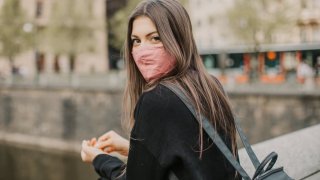
By the end of next year, the Covid pandemic could be over.
But that doesn't mean the coronavirus will disappear. In a blog post on Tuesday, Bill Gates laid out one seemingly likely scenario: "At some point next year, Covid-19 will become an endemic disease in most places."
If Covid becomes an endemic illness — a disease of relatively low severity that constantly circulates throughout certain parts of the world — the sickness' pandemic phase could come to a close in 2022, the Microsoft co-founder and billionaire health philanthropist wrote.
Medical experts, including White House chief medical advisor Dr. Anthony Fauci, agree that Covid may never completely vanish. "It's very unlikely that we're ever going to be able to get rid of Covid," Dr. Timothy Brewer, a professor of epidemiology at the UCLA Fielding School of Public Health, tells CNBC Make It.
The thought of coping with Covid forever might sound daunting, but living with an endemic virus is very different than the world's past year-and-a-half of pandemic life — and the transition won't happen overnight.
Here's how the pandemic could finally end next year, and what experts say that'll look like:
What the 'end of the pandemic' really means
Money Report
The first step is getting enough people vaccinated against Covid to downgrade the disease's pandemic status. In the U.S., only 64% of people five and older are fully vaccinated as of Thursday, according to data from the Centers for Disease Control and Prevention.
More vaccinations will help decrease the amount of severe cases, hospitalizations and deaths, signaling the beginning of Covid's transition to endemic, says Aubree Gordon, an infectious disease epidemiologist and associate professor at the School of Public Health at the University of Michigan.
For an example of an endemic virus, look at influenza. The flu constantly circulates in the background, rising and falling seasonally each year. People get vaccinated regularly against it, helping them build up multiple layers of immunity over many years.
Brewer says Covid will likely fall into a similar pattern: "Like most respiratory viruses, it's probably going to be worse during cold months and less so during warm."
Gordon agrees, noting that the layers of immunity will probably help make endemic Covid cases even less severe than today's hospitalizations and deaths.
What living with Covid could look like
Living with Covid will require a shift in mindset, Brewer says: "We have to stop acting like if we do everything right, we're going to make this virus completely go away."
Rather, he says, people should try to "minimize the health and economic consequences as much as possible, and get on with our lives."
In his blog post, Gates agreed. The risk of Covid will hopefully become so low that "you won't need to factor it into your decision-making as much," he wrote. "It won't be primary when deciding whether to work from the office or let your kids go to their soccer game or watch a movie in a theater."
During the colder parts of the year, some now-familiar prevention measures could remain widespread — like wearing masks in public indoor settings and staying home when you're sick to prevent spread, Brewer says.
There's a reason the playbook sounds familiar. "We don't necessarily have to come up with new interventions [to prevent Covid]," Brewer says. "It's just that we've got to do a better job continuing to do the things we know that work."
Outbreaks could still emerge in local communities, but the emergence of new antiviral Covid drugs — which aren't yet approved by the U.S. Food and Drug Administration — could help treat people and prevent the disease from massively spreading again, Gates wrote.
Covid boosters designed to target new variants could also become commonplace, since viruses that continually circulate often mutate into new strains, Gates noted. It's another familiar idea: Each year's flu vaccine is already designed for that season's dominant strains.
How omicron and other variants factor into the timeline
Omicron could present a curveball. At a media briefing Wednesday, World Health Organization director general Tedros Adhanom Ghebreyesus said omicron's many mutations and ability to spread "could have a major impact on the course of the pandemic."
But Brewer says the emergence of new variants isn't particularly surprising, and shouldn't affect the world's ability to shift Covid from pandemic to endemic.
Much remains unknown about omicron, including whether it causes severe illness and how much protection the vaccines and boosters provide. Early data indicates that it may be more transmissible than previous variants, but cause less severe infections and be defeated by booster shots.
A variant that manages to escape vaccine-induced immunity and causes severe infection would spell out significantly more trouble, Gordon says.
Whether or not this type of variant emerges is "the open question," she says. "I think it's definitely possible."
Sign up now: Get smarter about your money and career with our weekly newsletter
Don't miss:
Is returning to the office in January actually Covid-safe? Here's what experts say
With omicron out there, here's how to decide if you should attend that holiday party






